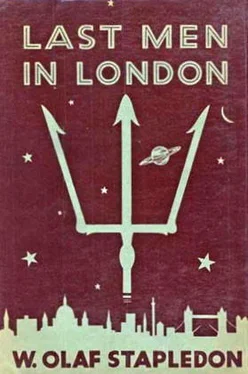He saw clearly that man, the most successful of all Terrestrial animals, who had mastered all rivals and taken the whole planet as his hunting-ground, could not master himself, could not even decide what to do with himself. All over the West man was visibly in decline. The great wave of European energy, which gave him mastery over nature, which carried the European peoples into every continent, which lent them for a while unprecedented intellectual vision and moral sensitivity, now visibly failed. And what had come of it? The Black Country and its counterpart in all Western lands, mechanized life, rival imperialisms, aerial bombardment, poison gas; for the mind, a deep and deadly self-disgust, a numbing and unacknowledged shame, a sense of huge opportunities missed, of a unique trust betrayed, and therewith a vast resentment against earlier generations, against human nature, against fate, against the universe. What more? An attempt to cover up guilt and futility by mechanical triumphs, business hustle, and the sound of a hundred million gramophones and radio-sets.
Paul asked himself ‘How has all this happened?’ And he answered, ‘Because we cannot look into our minds and see what really affords lasting satisfaction, and what is merely reputed to do so; because our individuality is a dimensionless point, because our personalities are but masks with nothing behind them. But in the East, where they say man is less superficial, what is happening? There, presumably, men have seen truths which the West has missed, But they stared at their truths till they fell into a hypnotic trance which lasted for centuries. They made it an excuse for shunning the world and all its claims, for gratifying themselves in private beatitude. And now, when at the hands of the West the world is forced on them irresistibly, they fall into the very same errors that they condemn in us. And the Russians? Socially they are the hope of the world. But have they as individual beings any more reality, any more percipience, than the rest of us?’
Over this despair, this disgust of human futility, Paul triumphed by taking both a longer and a wider view.
‘We shall win through,’ he told himself. ‘We must. Little by little, year by year, aeon by aeon, and in spite of long dark ages, man will master himself, will gain deeper insight, will make a better world. And if not man, then surely some other will in the end fulfil his office as the cosmical eye and heart and hand. If in our little moment he is in regression, what matter? The great music must not always be triumphant music. There are other songs beside the songs of victory. And all songs must find their singers.’
Shortly after the final meditation in which he summed up the whole issue of his inquiry, Paul wrote a poem in which he made it clear to himself, though with a certain bitterness, that he cared more for the music which is spirit than for the human or any other instrument. In the final couplet there appears the self-conscious disillusionment which is characteristic of your age.
If man encounter
on his proud adventure
other intelligence?
If mind more able
ranging among the galaxies,
noose this colt and break him
to be a beast of draught and burden
for ends beyond him?
If man’s aim and his passion be ludicrous
and the flight of Pegasus
but a mulish caper?
Dobbin! Pull your weight!
Better be the donkey of the Lord,
whacked on beauty’s errand
than the wild ass of the desert
without destination.
Vision! From star to star the human donkey
transports God’s old street organ and his monkey.
Paul had by now almost fulfilled the task that I had demanded of him. Not only had he collected for me an immense store of facts about the crisis of his species, facts the significance of which he himself often entirely failed to see, but also in his own experience he had already afforded me a very precise insight into the capacity of his kind. He had shown me, through years of inner turmoil, the aspirations and reluctances of a primitive being haunted by visions from a higher sphere. In particular he had shown me the limits of your intelligence and of your will. There were innumerable problems which Paul even with my patient help could never understand. There were austerities of beauty which even with my most earnest illumination he could not admire. But one test at least Paul had triumphantly passed. He had shown that it was possible for the average mentality of the First Men, under careful tuition, to apprehend without any doubt whatever the two supreme and seemingly discordant offices of the individual mind, namely, loyalty to man and worship of fate. To the Last Men these offices are displayed as organic to one another; but to the First Men, they are for ever discrepant. Paul’s intellect at least saw this discrepancy, and refused to be put off with false solutions of the problem. For the rest though he so clearly recognized that all human purposes should be subordinated to these two supreme ends, he himself, like the rest of his kind, was but a frail vessel.
Since I had no further use for Paul as a visual and auditory instrument through which to examine your world, I now ceased to trouble him with the insatiable lust of inquiry which had mastered him since the conclusion of the war. Hitherto he had pursued his task indefatigably, but now his energy began to flag. This was due partly to the withdrawal of my stimulation, partly to the fact that his uncapacious brain was already charged to the full and could bear no more, partly also to the long physical strain of the double life which he had led. For Paul had indeed been wearing himself out. Katherine, with whom he still spent an occasional week, had declared that he was withering before his time, that his arms and legs were sticks and his ribs an old rat-trap. Privately she had noted also that his embraces had lost their vigour. She had urged him to ‘take things easy for a while’. And now at last he discovered that he had in fact neither the energy nor the inclination to pursue the old racketing way of life.
I made it clear to him that I required no more work of him, but that I should continue to be with him to observe the movements of his mind during his normal career. For, though I had no further use for him as an exploratory instrument, it was my intention to watch the way in which his Neptunian tincture would influence him in middle age and senility. At this juncture Paul displayed rather interestingly the weakness of his kind by futile rebellion, and an attempt to pursue a heroic career for which he was unsuited. I must not dwell upon this incident, but it may be briefly recorded for the light which it throws upon your nature. He had already, it will be remembered, become convinced that his race was heading for a huge disaster, from which nothing could save it but an impossible change of heart, of native capacity. In spite of the current ‘world-economic crisis’, he had no serious expectation of a sudden catastrophe; but he had come to believe in a long-drawn-out spiritual decline, masked by a revival of material prosperity. He looked forward to centuries, perhaps millennia, of stagnation, in which the half-awakened mind of man would have sunk back once more into stupor. But he saw this phase as but a momentary episode in the life of the planet. And he saw the little huge tragedy of the modern world as, after all, acceptable, a feature of cosmical beauty. He knew, moreover, not clearly but yet with conviction, that he himself had played some small part in apprehending the drama of his age for the cognizance of the mature and final human mind. He knew also that without my continuous support he had no outstanding ability. Yet, though fundamentally he had accepted all this, and was indeed profoundly at peace, he could not express this acceptance and this peace in conduct. He could not bring himself to participate in the tragedy without making efforts to avert it, efforts which he knew must be futile, because in the first place he himself was not made of the stuff of prophets, and because in the second place the nature of his species was inadequate. Though he knew it was so, an irrational fury of partisanship now seized him. Instead of continuing the work which he could do tolerably well, instead of striving by his school-teaching to elicit in certain young minds an enhanced percipience and delight, he must needs take it upon himself to become the prophet of a new social and spiritual order.
Читать дальше












